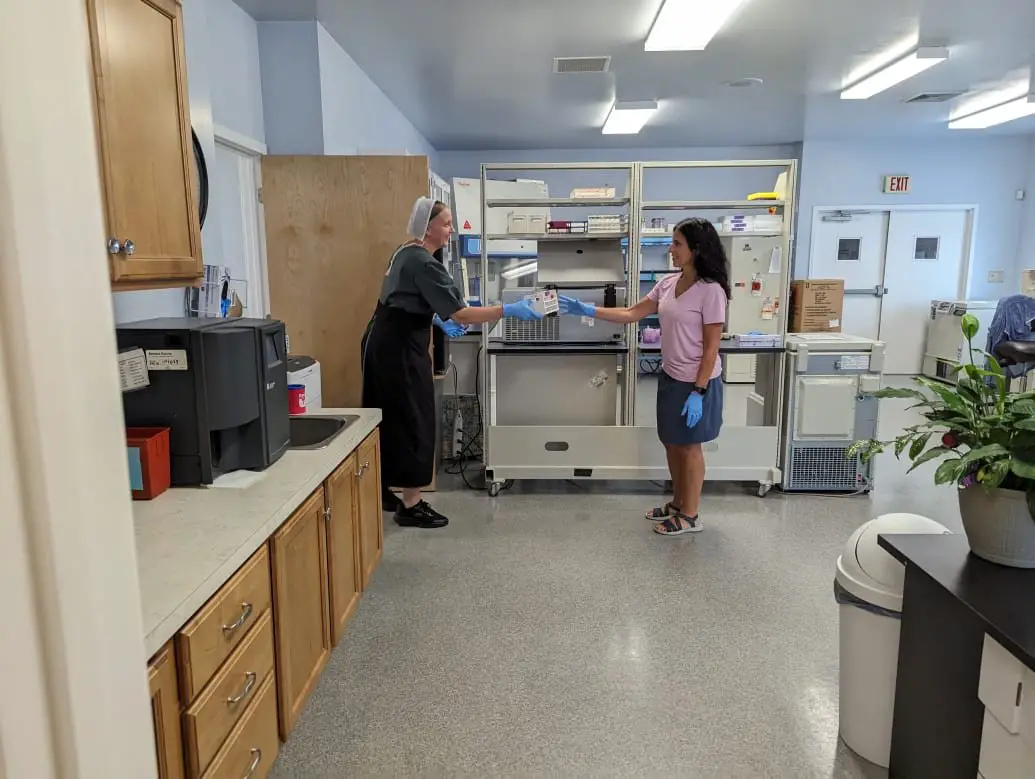An Amish family in Lancaster, Pennsylvania had long known that their son was deeply upset and unhappy. Now in his early twenties, he hadn’t thrived and found his way as a productive member of their farming community of 40,000 Old Order Amish. The family faced many barriers in dealing with their children’s mental health.
When cases like these reach a crisis point, the Amish community provides support groups for people whose mental illness affects their ability to function, Susan Shaub, a registered nurse and nurse coordinator for the Amish Research Center (ARC) in Lancaster, told The Daily Beast. They help them find work, usually within the community, that fits their functional level. They assist them in managing finances and organize charity sales to raise money to cover expenses.
Often, these support staff also enroll the affected person in mental health-related medical research studies at the ARC.
Amish family members are more likely to participate in a study if they know some of their siblings participated, said Shaub, who has worked at the ARC since 2004. Those with siblings who have significant mental health issues often take part in the hope that the research will lead to better treatments.

Amish attendees arriving at the ARC.
Kate Autry
For nearly half a century, medical researchers working with the Amish have uncovered important discoveries. According to Seth Ament, a geneticist and neuroscientist at the University of Maryland School of Medicine in Baltimore, Amish studies have led to the discovery of many genes and genetic associations relevant to cardiometabolic traits, bipolar disorders, brain aging and autism. One of the genetic variants enriched in the Amish population, Ament added, is associated with an increased risk of long QT syndrome, a form of cardiac arrhythmia that can lead to sudden death from heart attacks, sometimes with no prior symptoms.
What is unique about the old order Amish is that the burdens associated with these diseases are spread across the whole family because they are essentially a family of 40,000, Ament told The Daily Beast. Because the Amish family is so large, there are opportunities to develop precision medicine strategies in the Amish that could be applied to a larger population in the future.
A recent study published in the journal Molecular psychiatry has increased scientists’ understanding of the genetic causes of depression, bipolar disorder and other mental illnesses that afflict an estimated 300 million people worldwide.
What we knew before our study is that genetic factors account for up to 80 percent of the risk of bipolar disorder and up to 50 percent of the risk of major depressive disorder, said Ament, co-author of that new study. Most affected people in the general population inherit many risk variants, each of which has very little effect. But in the Amish population, we were able to identify specific genetic variations in four chromosomal regions that double or triple the risk of having a mood disorder. These genomic changes were previously unknown to researchers.
These revelations are the culmination of nearly a decade of work by Ament and his team, who analyzed genome-wide association studies of Old Order Amish patients at the university’s Amish Research Clinic. They may lead to a deeper understanding of the causes of mental illness in a larger population, as well as potential targets for new drug development.
Geneticists consider this specific Amish community in Lancaster to be a founder population, meaning they are direct descendants from an initial community of a few people. In this case, the Lancastrian Amish comes from 400 people who immigrated to the United States from Western Europe (mostly of Swiss-German descent) in the late 1700s.

For religious reasons, the Amish only intermarry within their community, so as that original population has expanded to 40,000 in the present day, genetic variation within the population remains primarily derived from the original 400 founders.
In other words, the members of this Old Order Amish in Lancaster represent an extremely large family with approximately 40,000 members.
That’s one of the interesting things about population, Ament said. They are very close to us, yet they are a very distinct group genetically and culturally.
Because genetic variation within this community is so narrow, there may be particular DNA variants in the genes of Amish individuals that are more easily discovered, according to Jonathan Pevsner, chief of genomics research at the National Institutes of Mental Healths.
Studying mood disorders in the Amish is something we think is especially useful, Pevsner told The Daily Beast. There are other founder populations around the world that we also support the study of, but in the case of the Amish it was very productive.
Ament pointed out that the Amish who participate in the studies find the research mutually beneficial to their community, so they see the work as a two-way relationship.
The study of mood disorders in the Amish is something we think is particularly useful, it has been highly productive
Jonathan Pevsner, National Institutes of Mental Health
For religious reasons, the Amish don’t use some modern technologies, but they are very savvy and understand that people who are members of founder populations are at risk for some rare ailments, Ament said. They also understand that their genetics are valuable to the wider community, so they sign up for these studies and allow us to study their families, and the research is supported by the leaders of their parishes.
Although the ARC was first established in 1994, Ament traced the origins of these Amish studies even further back to Victor McKusick, widely considered the father of medical genetics. McKusick, who died in 2008, had begun enrolling Amish patients with bipolar disorder in his genetic studies at the Johns Hopkins School of Medicine in the 1970s, discovering the recessive gene’s links to several disorders. .
Ament said he was inspired by McKusick’s sensitive but focused approach to studying the Old Order Amish of Pennsylvania as a group with a relatively isolated gene pool. He realized that he could use their medical and genetic histories to quickly identify the genes responsible for their inherited physical abnormalities and ailments.

Amish blood samples delivered to the ARC.
Kate Autry
At the time, researchers didn’t know much about the genetic architecture of the disease, and there was hope that there might be a single mutation that explains mental health disorders.
I’m not saying our study is the culmination of Dr. McKusick’s work, but a substantial advance in Amish mood disorder studies, Ament said. We are making real progress in understanding the mechanisms in the brain that contribute to illnesses such as bipolar disorder and depression which, over time, will most likely lead to more precise ways to treat these illnesses.
Shaub told The Daily Beast that the clinic has always carefully approached mental health studies in the Amish community to ensure confidentiality for anyone participating in a study. From the beginning, the clinic’s nurses have worked closely with Amish connections to help open doors and recruit patients. There are currently 17 relationships involved with eight active studios.
Over the years, the community has realized that even though these women are part of the community, they are held to our HIPPA patient privacy standards, she said. People know they can be comfortable sharing things in the presence of our contacts and will be kept confidential.
One of the connections, Lavina Ebersol, who helped recruit patients for the Aments study, told The Daily Beast: You could tell people who may have had mental health issues because they just sat there a little more quiet and hesitant, and those who may have had it in their families were a little more open and willing to talk about it and participate in the study to do whatever they could to help their relatives.
While they don’t know what the end results will be because the ARC conducts long-term research studies, Shaub said Amish participants see mental health problems in generation after generation families, so they want to help improve the situation for the next generation if possible.
The ones they could have [mental health issues] in their families they were a little more open and willing to talk about it and participate in the study to do everything possible to help their relatives.
Lavina Ebersol
He added there may not be an immediate benefit to patients’ mental health, but they are treated well, such as eating breakfast when they had to fast before blood tests. Everyone gets blood screenings to test their cholesterol levels and risk for diabetes or cardiovascular disease, just to give them a little piece of something for what they’ve done for us, Shaub said.
The ARC is only one part of a larger network of similar research centers in the Midwest. The clinic is currently developing two collaborative studies it plans to launch soon with Das Deutsch Clinic (DDC) for children with special needs in Middlefield, Ohio, just east of Cleveland. One will look at genetic diversity in general populations and the other will study cardiomyopathy, according to Heng Wang, medical director for the DDC. Unlike the ARC, the DDC Clinic studies and treats patients with rare genetic diseases.
The work we do focuses primarily on monogenic disorders in which a single gene is involved, while Dr. Aments’ study involves complex disorders in which multiple genes play a role, often in conjunction with environmental factors, Wang said. Our patients, like everyone else, may have mood disorders in addition to the condition they have, and they may benefit from studying him.
In a study published in 2011, Wang identified the gene that causes a rare congenital condition in the Amish population called glucose-galactose malabsorption. Infants and children worldwide with the disease cannot absorb sugars adequately. As a result, unabsorbed sugars in the baby’s gut cause severe diarrhea and dehydration which, if left untreated, can be life-threatening, and many babies and children have died from the condition. Also, these babies cannot be breastfed because breast milk contains lactose sugar which cannot be adequately absorbed. In collaboration with other researchers, Wang and her team determined that a simple treatment is to remove sugars from infants’ diets or from infant formula in infants.
At DDC, Wang said, they now diagnose two to five children with the disease each year through DNA testing.
#keys #mental #illness #lie #Amish #genes
Image Source : www.thedailybeast.com